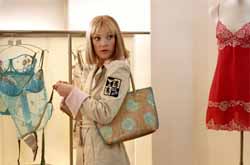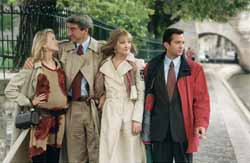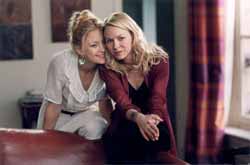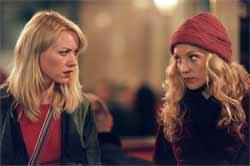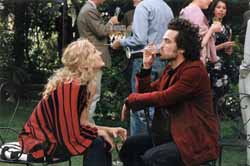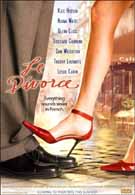What do you get when you combine an adorable modern day ingénue, named for the beloved Henry James heroine Isabel Archer, with the bewitching intoxication of the City of Light? The answer: Le Divorce, a dazzling international comedy of manners and morals from the genteel folks at Merchant Ivory.
Based on the best-selling novel by acclaimed American author Diane Johnson, Le Divorce chronicles the urbane tale of Isabel (Kate Hudson) and Roxeanne Walker (Naomi Watts), two Santa Barbara sisters living together in Paris. The film opens with Isabel, a former USC student just credits shy of earning a Bachelors Degree in Film, emerging from a transatlantic flight so she can help her pregnant stepsister with her three-year-old daughter, Geneviève. Excited, but visibly apprehensive about her new status as "an American in Paris," Isabel stumbles up to the customs desk with a dreamy, passionate look that clearly screams, "Viva La France!" Ironically, it's as if the laid back California blond knows this continental experience will ultimately transform her into a newer, more uninhibited woman. One who truly understands what it means to be a sexy, young Parisian.
Only once Isabel arrives on the gorgeous tree-lined avenues of the Place Maubert, a chic section of Paris located in the center of the fifth arrondissement, she soon learns that Charles-Henri (Melvil Poupaud), Roxeanne's unfaithful French husband, has walked out. He has left Roxeanne, Gennie, and the couple's unborn child, for the woman he calls, "the love of his life."
Of course, this isn't news to Suzanne de Persand (Leslie Caron), Charles-Henri's meddlesome mother, who indifferently tells her virtuous daughter-in-law not to worry. After all, extramarital affairs are intended to be temporary and usually don't amount to anything beyond sex and champagne. "This has happened to other (French) woman, often, and by far the best course, they would most of them tell you, is to just go on with life as it unrolls."
Luckily, life isn't unrolling quite as dramatically for Isabel as it is for poor Roxy, who eventually learns that Charles-Henri wants a divorce, so he can marry his vulgar Russian mistress, Magda. Sharing her brother-in-law's need for French liberation, Isabel makes a lunch date with the charming and debonair Edgar Cosset (Thierry Lhermitte), Madame Suzanne's brother. But she finds herself in a rather provocative situation when the handsome French cad nonchalantly says, "Now we must decide if you are going to be my mistress." To which a smitten Isabel asks, "What….ah…what exactly do you mean be your mistress?"
At this point, Le Divorce sashays into familiar Merchant Ivory territory, skewering a variety of razor-sharp Franco-American provincialisms that neither culture would likely acknowledge. For example, when Suzanne and Roxy find out about Edgar and Isabel's burgeoning love affair, a discovery that is deemed credible the minute Isabel places a red alligator bag called a "Kelly," on her delicate shoulder, Suzanne worries about the affair's inappropriate timing, while Roxy worries about her sister's feelings.
Isabel, on the other hand, can't understand why a lovely young woman, like herself, shouldn't be attracted to the worldly charms of the fastidious Edgar, and decides to lure the right-wing politician into bed with a stylish new bob and a sexy black bra that she bought while at a posh lingerie store.
Your Daily Blend of Entertainment News
Kate Hudson, who plays the delightful, yet devilish Isabel Walker, anchors the film with her mesmerizing performance as the effervescent innocent hell-bent on becoming a sophisticated seductress. However, it's the luminous Naomi Watts that ends up stealing the screen with her flawless performance as an abandoned wife who suddenly realizes that in the eyes of her haughty French in-laws, she's little more than an uncivilized American.
Jam-packed with enough star power to permanently illuminate the Eiffel Tower, Le Divorce is at its sparkly best when it avoids the inevitable French twist, a scandalous subplot involving a saintly portrait possibly painted by the illustrious Georges de La Tour, in favor of the timely social topic of divergent Franco-American values. In the end, this is exactly what gives Le Divorce its bittersweet edge, turning this delicious little bonbon into a winning tragicomedy about the oddities of two uniquely wacky cultures.

